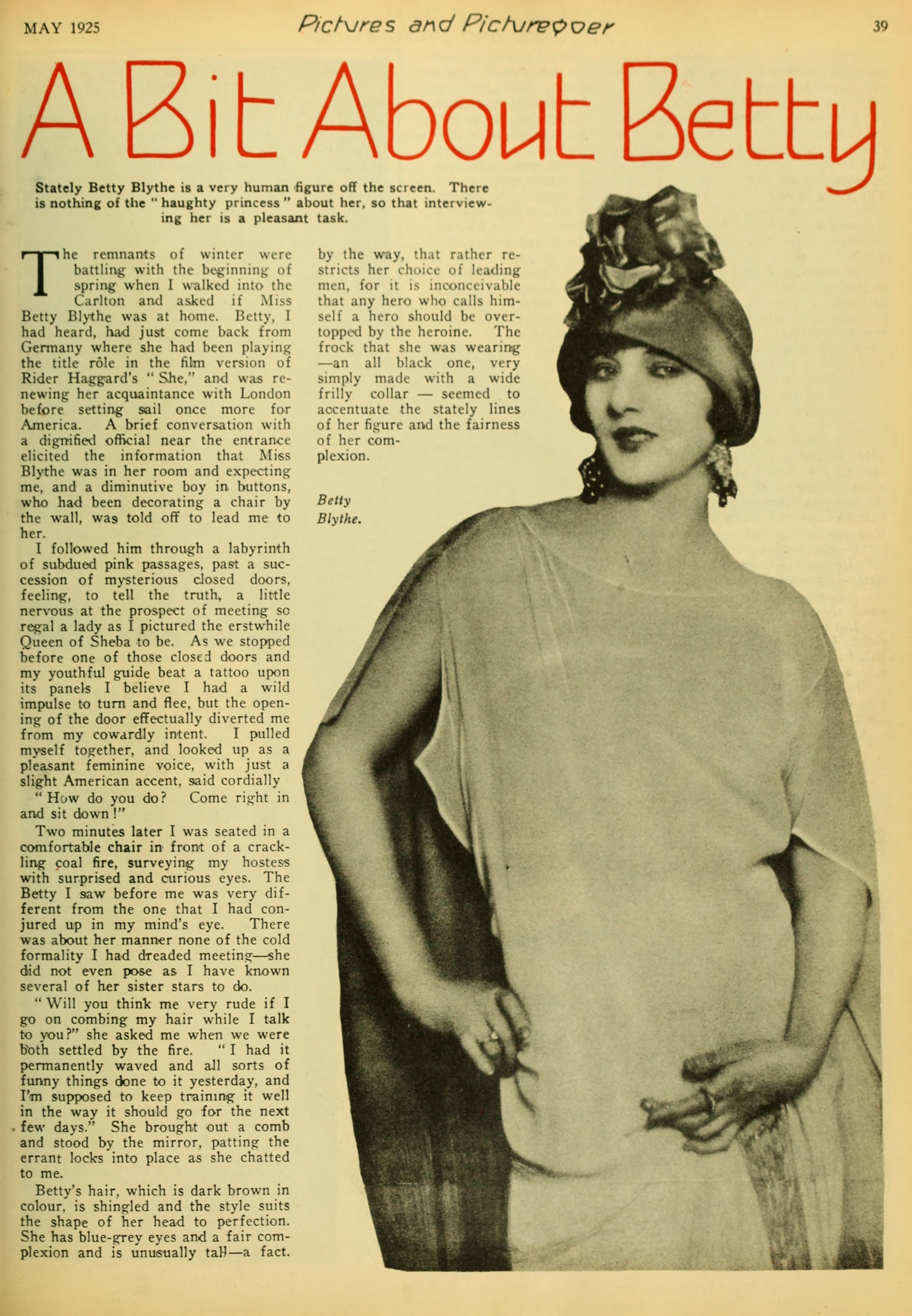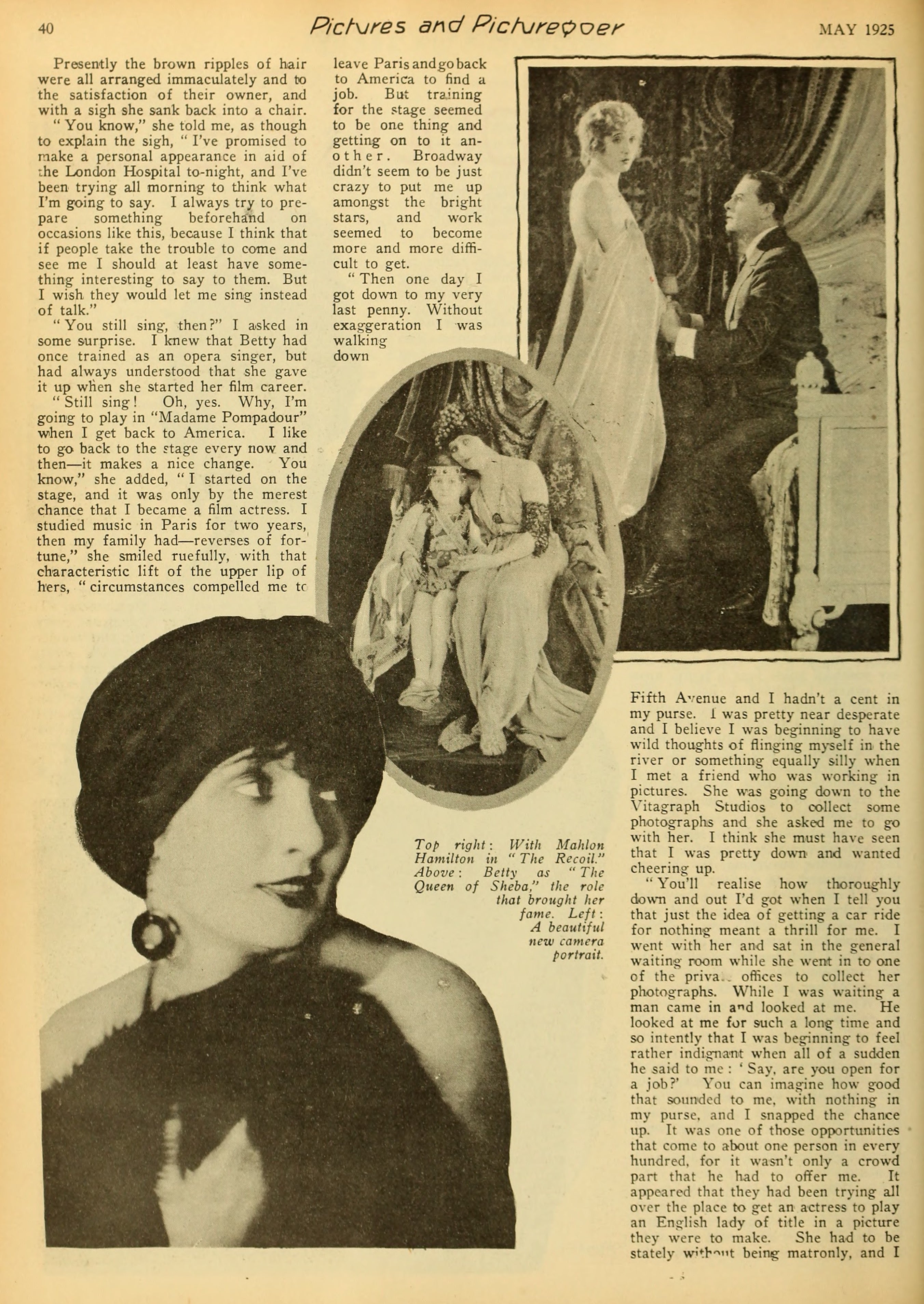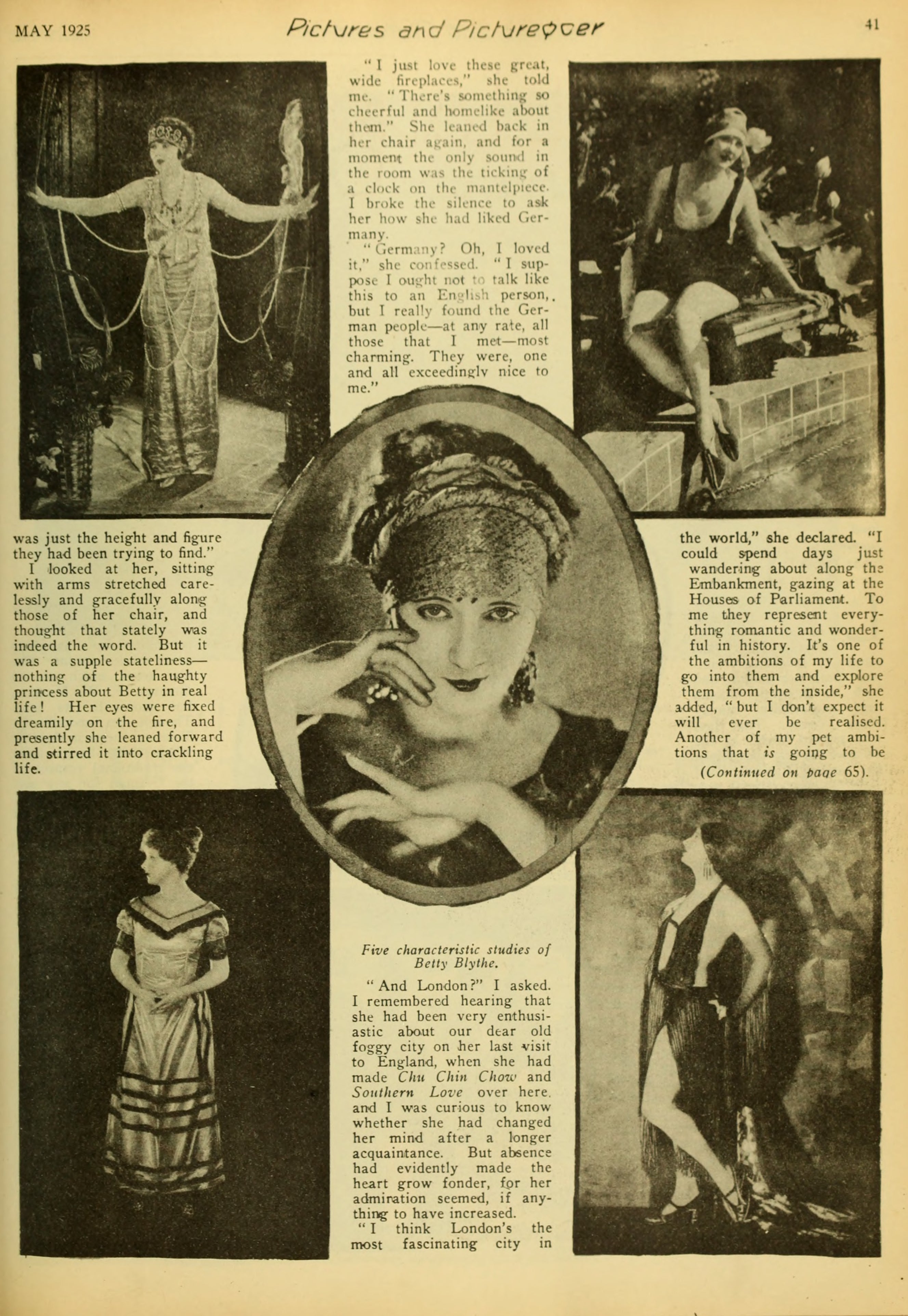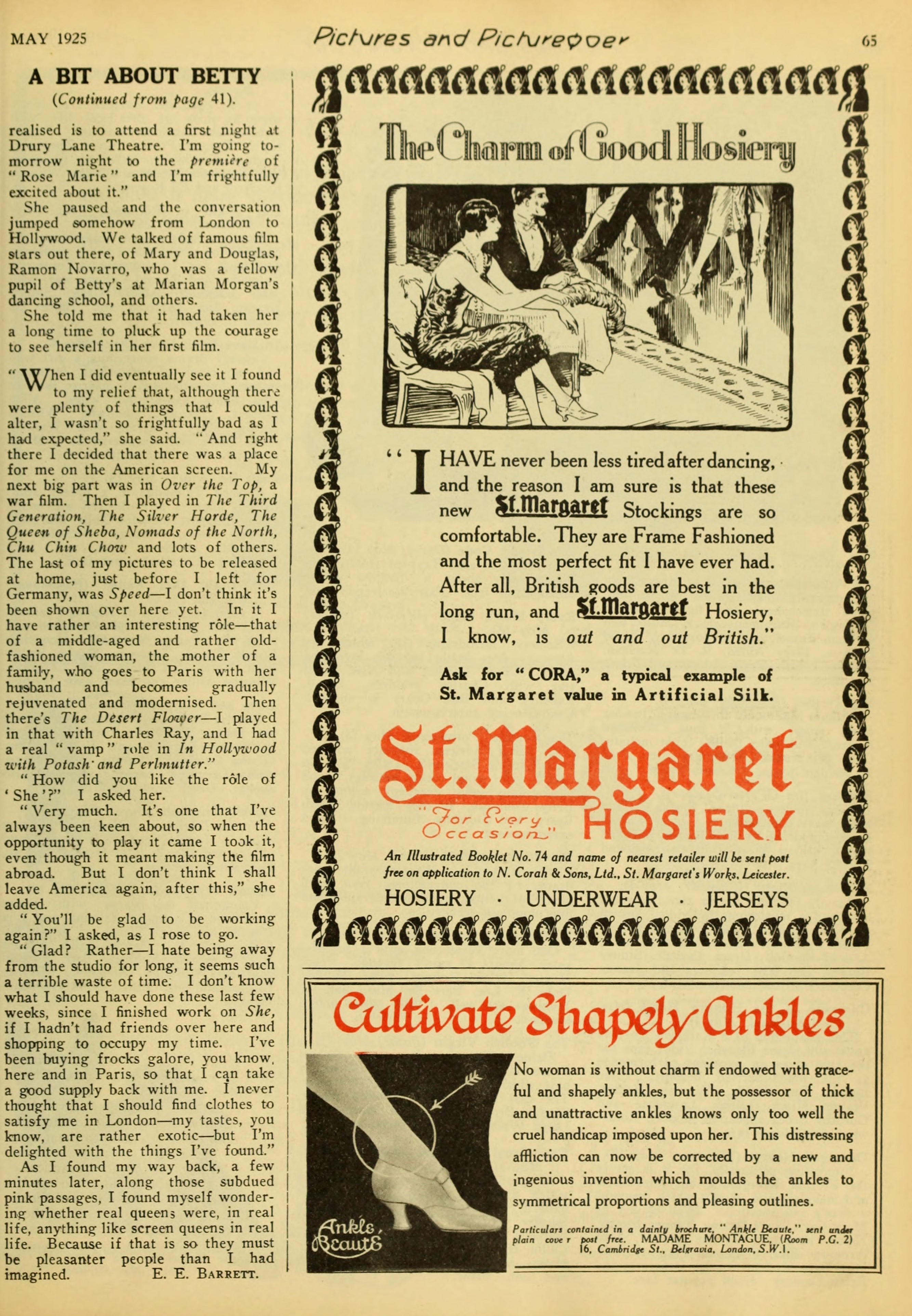Betty Blythe — A Bit About Betty (1925) 🇬🇧

The remnants of winter were battling with the beginning of spring when I walked into the Carlton and asked if Miss Betty Blythe was at home.
by E. E. Barrett
Betty, I had heard, had just come back from Germany where she had been playing the title role in the film version of Rider Haggard’s She, and was renewing her acquaintance with London before setting sail once more for America. A brief conversation with a dignified official near the entrance elicited the information that Miss Blythe was in her room and expecting me, and a diminutive boy in buttons, who had been decorating a chair by the wall, was told off to lead me to her.
I followed him through a labyrinth of subdued pink passages, past a succession of mysterious closed doors, feeling, to tell the truth, a little nervous at the prospect of meeting so regal a lady as I pictured the erstwhile The Queen of Sheba to be. As we stopped before one of those closed doors and my youthful guide beat a tattoo upon its panels I believe I had a wild impulse to turn and flee, but the opening of the door effectually diverted me from my cowardly intent. I pulled myself together, and looked up as a pleasant feminine voice, with just a slight American accent, said cordially “How do you do? Come right in and sit down!”
Two minutes later I was seated in a comfortable chair in front of a crackling coal fire, surveying my hostess with surprised and curious eyes. The Betty I saw before me was very different from the one that I had conjured up in my mind’s eye. There was about her manner none of the cold formality I had dreaded meeting — she did not even pose as I have known several of her sister stars to do.
“Will you think me very rude if I go on combing my hair while I talk to you?” she asked me when we were both settled by the fire. “I had it permanently waved and all sorts of funny things done to it yesterday, and I’m supposed to keep training it well in the way it should go for the next few days.” She brought out a comb and stood by the mirror, patting the errant locks into place as she chatted to me.
Betty’s hair, which is dark brown in colour, is shingled and the style suits the shape of her head to perfection. She has blue-grey eyes and a fair complexion and is unusually tall — a fact, by the way, that rather restricts her choice in leading men, for it is inconceivable that any hero who calls himself a hero should be over-topped by the heroine. The frock that she was wearing — an all black one, very simply made with a wide frilly collar — seemed to accentuate the stately lines of her figure and the fairness of her complexion.
Presently the brown ripples of hair were all arranged immaculately and to the satisfaction of their owner, and with a sigh she sank back into a chair.
“You know,” she told me, as though to explain the sigh, “I’ve promised to make a personal appearance in aid of the London Hospital to-night, and I’ve been trying all morning to think what I’m going to say. I always try to prepare something beforehand on occasions like this, because I think that if people take the trouble to come and see me I should at least have something interesting to say to them. But I wish they would let me sing instead of talk.”
“You still sing, then?” I asked in some surprise. I knew that Betty had once trained as an opera singer, but had always understood that she gave it up when she started her film career.
“Still sing! Oh, yes. Why, I’m going to play in Madame Pompadour when I get back to America. I like to go back to the stage every now and then — it makes a nice change. You know,” she added, “I started on the stage, and it was only by the merest chance that I became a film actress. I studied music in Paris for two years, then my family had — reverses of fortune,” she smiled ruefully, with that characteristic lift of the upper lip of hers, “circumstances compelled me to leave Paris and go back to America to find a job. But training for the stage seemed to be one thing and getting on to it another. Broadway didn’t seem to be just crazy to put me up amongst the bright stars, and work seemed to become more and more difficult to get.
“Then one day I got down to my very last penny. Without exaggeration I was walking down Fifth Avenue and I hadn’t a cent in my purse, I was pretty near desperate and I believe I was beginning to have wild thoughts of flinging myself in the river or something equally silly when I met a friend who was working in pictures. She was going down to the Vitagraph Studios to collect some photographs and she asked me to go with her. I think she must have seen that I was pretty down and wanted cheering up.
“You’ll realise how thoroughly down and out I’d got when I tell you that just the idea of getting a car ride for nothing meant a thrill for me. I went with her and sat in the general waiting room while she went in to one of the private offices to collect her photographs. While I was waiting a man came in and looked at me. He looked at me for such a long time and so intently that I was beginning to feel rather indignant when all of a sudden he said to me: ‘Say, are you open for a job?’ You can imagine how good that sounded to me, with nothing in my purse, and I snapped the chance up. It was one of those opportunities that come to about one person in every hundred, for it wasn’t only a crowd part that he had to offer me. It appeared that they had been trying all over the place to get an actress to play an English lady of title in a picture they were to make. She had to be stately without being matronly, and I was just the height and figure they had been trying to find.” I looked at her, sitting with arms stretched carelessly and gracefully along those of her chair, and thought that stately was indeed the word. But it was a supple stateliness — nothing of the haughty princess about Betty in real life! Her eyes were fixed dreamily on the fire, and presently she leaned forward and stirred it into crackling life.
“I just love these great, wide fireplaces,” she told me. “There’s something cheerful and homelike about them.” She leaned back in her chair again, and for a moment the only sound in the room was the ticking of a clock on the mantelpiece. I broke the silence to ask her how she had liked Germany.
“Germany? Oh, I loved it,” she confessed. “I suppose l ought not to talk like this to an English person, but I really found the German people — at any rate, all those that I met — most charming. They were, one and all exceedingly nice to me.”
“And London?” I asked. I remembered hearing that she had been very enthusiastic about our dear old foggy city on her last visit to England, when she had made “Chu Chin Chow” and “Southern Love” over here, and I was curious to know whether she had changed her mind after a longer acquaintance. But absence had evidently made the heart grow fonder, for her admiration seemed, if anything to have increased. “I think London’s the most fascinating city in the world,” she declared. “I could spend days just wandering about along the Embankment, gazing at the Houses of Parliament. To me they represent everything romantic and wonderful in history. It’s one of the ambitions of my life to go into them and explore them from the inside,” she added, “but I don’t expect it will ever be realised. Another of my pet ambitions that is going to be realised is to attend a first night at Drury Lane Theatre. I’m going tomorrow night to the premiere of Rose Marie and I’m frightfully excited about it.”
She paused and the conversation jumped somehow from London to Hollywood. We talked of famous film stars out there, of Mary and Douglas [Mary Pickford and Douglas Fairbanks Sr.], Ramon Novarro, who was a fellow pupil of Betty’s at Marian Morgan’s dancing school, and others.
She told me that it had taken her a long time to pluck up the courage to see herself in her first film.
“When I did eventually see it I found to my relief that, although there were plenty of things that I could alter, I wasn’t so frightfully bad as I had expected,” she said. “And right there I decided that there was a place for me on the American screen. My next big part was in ‘Over the Top,’ a war film. Then I played in “The Third Generation,” The Silver Horde, The Queen of Sheba, Nomads of the North, Chu Chin Chow and lots of others. The last of my pictures to be released at home, just before I left for Germany, was “Speed” — I don’t think it’s been shown over here yet. In it I have rather an interesting role — that of a middle-aged and rather old-fashioned woman, the mother of a family, who goes to Paris with her husband and becomes gradually rejuvenated and modernised. Then there’s The Desert Flower [Transcriber’s Note: Possibly, this refers to Percy (1925), which was originally titled The Desert Fiddler] — I played in that with Charles Ray, and I had a real “vamp” role in ‘In Hollywood with Potash and Perlmutter.’”
“How did you like the role of She?” I asked her.
“Very much. It’s one that I’ve always been keen about, so when the opportunity to play it came I took it, even though it meant making the film abroad. But I don’t think I shall leave America again, after this,” she added.
“You’ll be glad to be working again?” I asked, as I rose to go.
“Glad? Rather — I hate being away from the studio for long, it seems such a terrible waste of time. I don’t know what I should have done these last few weeks, since I finished work on She, if I hadn’t had friends over here and shopping to occupy my time. I’ve been buying frocks galore, you know, here and in Paris, so that I can take a good supply back with me. I never thought that I should find clothes to satisfy me in London — my tastes, you know, are rather exotic — but I’m delighted with the things I’ve found.”
As I found my way back, a few minutes later, along those subdued pink passages, I found myself wondering whether real queens were, in real life, anything like screen queens in real life. Because if that is so they must be pleasanter people than I had imagined.


Top right: With Mahlon Hamilton in “The Recoil.”
Above: Betty as The Queen of Sheba, the role that brought her fame.
Left: A beautiful new camera portrait.

Five characteristic studies of Betty Blythe.

Collection: Picturegoer Magazine, May 1925

Comments
B. White said:
I have over 500 copies of 5×11 studio photos of Betty Blyth and photos of all the scenes in the Queen of Sheba movie … stages scenes etc.
My wife’s mother was close relative of Betty Blyth. We also hv Bettys 1930 fox cape a really fancy cape for formal occasions.